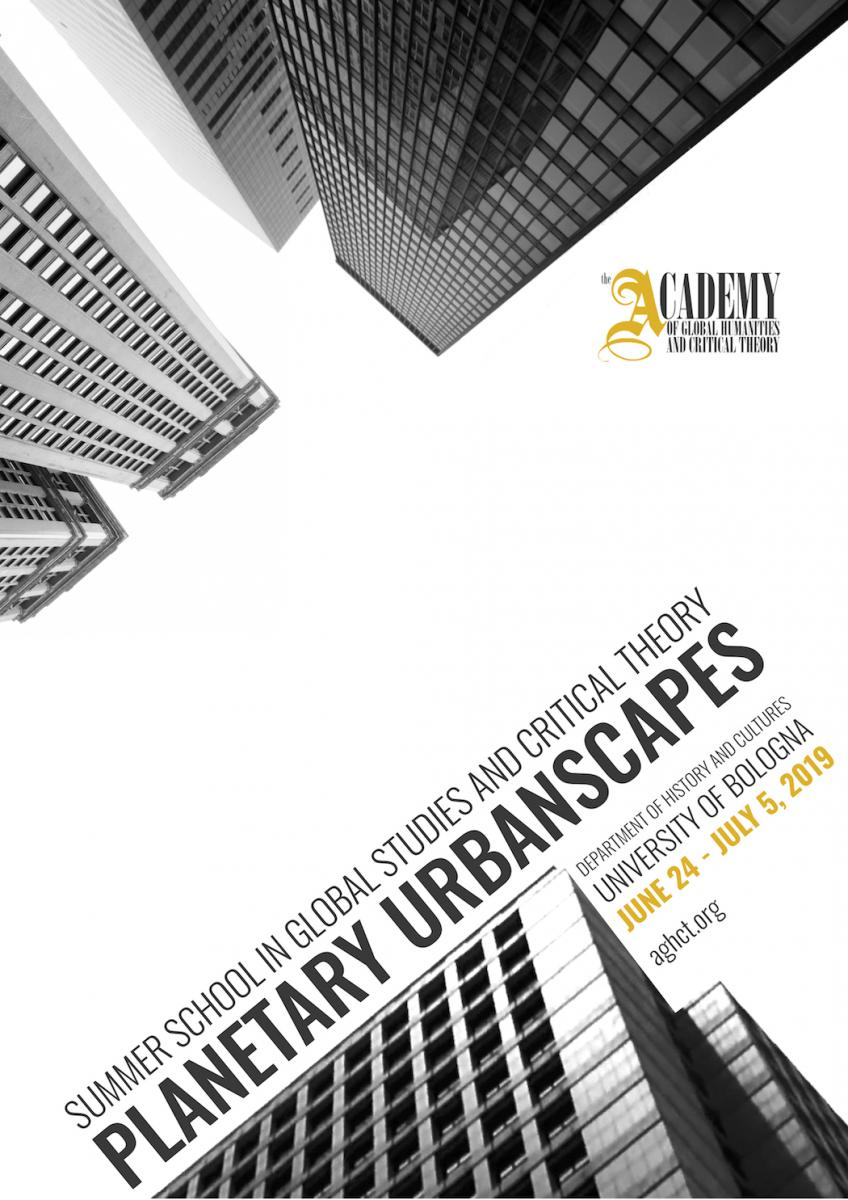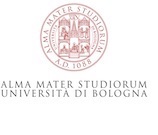Summer School in Global Studies and Critical Theory
PLANETARY URBANSCAPES
Bologna • June 24 – July 5, 2019

If yesterday the city was recognized as a distinctive and bounded type of settlement whose qualities resided in its sounds, rhythms and textures, today what “cities” or the “urban” are can no longer be taken for granted (see Robinson,2015).
Major shifts in urban studies have emerged through a new phase of planetary urbanization. A key manifestation of this phase is the emergence in the global South of new forms of urban landscapes of which the mega-city or meta-region phenomenon is a privileged instantiation, as Ananya Roy’s work has suggested. Typical of this phase is also the offshore city, a physical, infrastructural and spatial assemblage which operates on the basis of internal self-containment.
Elsewhere, including in the North, cities are no longer one locality, but a complex of trans-localities, an entangled junction of multiple spatialities (see McGuirk, 2015). They are increasingly understood to be structures of feeling and affect, logistical sites and circulatory systems through which forms and bodies, goods and materials are moving and life itself is lived. They are sites of experimentation with shifting forms of governance and multi-scalar networking, while the development of urban social movements continually reframes the meaning and the scope of the “right to the city.” (Henri Lefebvre, 1968)
The 2019 Summer School will revisit early twenty-first century urban landscapes in light of these shifts. Particular attention will be paid to the extent to which their production is entangled with the movements of global capital and the vagaries of the world’s financial markets, at a time of enhanced computing and technological power, rising inequalities, escalating changes of the internal dynamics of the Earth System (see Kruth, 2018) and widespread popular authoritarianism. Of crucial importance will be the analysis of neoliberal policies based on partition from the poor city, of slum infrastructures both carrying the aftermaths, very often, of colonial violence; and of cities of extraction disconnected from histories of industrialisation. These broken landscapes, distorted by crime as well as by heterogeneous forms of public and private violence, are also often places of conviviality, unpredictable encounters, solidarity and unexpected forms of urban communing (see for example de Boeck, 2017). To state the obvious, if the ancient polis was the origin of the concept of the political, we will be asking: what ideas of the political emerge in contemporary cityscapes?
Early twenty-first century urban landscapes are shaped by biophysical and chemical processes that transport and transform materials and energy and thus provide the conditions necessary for life. They are made and remade by changes in the climate system, including oceans and seas, wind, heat, precipitations and the atmosphere (see Derickson, 2017). Cities will be apprehended as aqueous territories capable of generating and guiding design with the environment as an active participant in the process Port cities and littoral cities in particular will be read from their ocean edge, the materialities of their sea as well as its histories of slavery and maritime imperialism.
Finally we will pay attention to early twenty-first urban landscapes as much as works of the imagination as works of material social construction. Changing our emphasis to focus on flows and movement, migration and mediation more than on structures and settlements, we will assess the extent to which urban dwellers combine the reality of motion and the desire for stability.
Up to 40 participants will be selected and required to attend all plenary lectures, the two morning courses, and at least one afternoon class per week.
The Academy and other sponsors offer several grants covering fees, accomodation and/or travel.
|
MONDAY, JUNE 24
|
|
4.30 pm
Welcome and registrations (Piazza San Giovanni in Monte, 2, Aula Gualandi)
7.00-7.30 pm
Welcoming cocktail (Cortile Guido Fanti, Piazza Maggiore, 6) 8:00 pm
Lecture SASKIA SASSEN, The Rise of Predatory Formations (Cortile Guido Fanti, Piazza Maggiore, 6, open to the public)
|
|
TUESDAY, JUNE 25
|
|
10.00-12.00 am
Morning course
ACHILLE MBEMBE and SARAH NUTTALL, Lagos-Johannesburg-Kinshasa: Conceptual Corridors (Piazza San Giovanni in Monte, 2, Aula Fumagalli)
2.00-4.00 pm
Afternoon courses
• RANJANA KHANNA, SARAH NUTTALL and DEBJANI GANGULY, Divided City; Spectral City (Piazza San Giovanni in Monte, 2, Aula Fumagalli) • CAMILLA FOJAS, Surveillant Spaces: Cities, Borders, States (Piazza San Giovanni in Monte, 2, Aula Specola)
• JOCELYN OLCOTT, Feminism and Urbanism in Contemporary Latin America (Piazza San Giovanni in Monte, 2, Aula Gambi)
4.30-6.30 pm
Workshop
The City and The City, with BAUMHAUS, MICHELE LAPINI, CHECKPOINT CHARLY (Piazza San Giovanni in Monte, 2, Aula Gambi)
8:00 pm
Critical dialogue
The Globalization of the Urban Form and its Discontents
SANDRO MEZZADRA and SASKIA SASSEN (Cortile Guido Fanti, Piazza Maggiore, 6, open to the public) |
|
WEDNESDAY, JUNE 26
|
|
10.00-12.00 am
Morning course
ACHILLE MBEMBE and SARAH NUTTALL, Lagos-Johannesburg-Kinshasa: Conceptual Corridors (Piazza San Giovanni in Monte, 2, Aula Fumagalli)
2.00-4.00 pm
Afternoon courses
• RANJANA KHANNA, SARAH NUTTALL and DEBJANI GANGULY, Divided City; Spectral City (Piazza San Giovanni in Monte, 2, Aula Fumagalli) • CAMILLA FOJAS, Surveillant Spaces: Cities, Borders, States (Piazza San Giovanni in Monte, 2, Aula Specola)
• JOCELYN OLCOTT, Feminism and Urbanism in Contemporary Latin America (Piazza San Giovanni in Monte, 2, Aula Gambi)
4.30-6.30 pm
Workshop
The City and The City, with BAUMHAUS, MICHELE LAPINI, CHECKPOINT CHARLY (Piazza San Giovanni in Monte, 2, Aula Gambi)
|
|
THURSDAY, JUNE 27
|
|
10.00-12.00 am
Morning course
ACHILLE MBEMBE and SARAH NUTTALL, Lagos-Johannesburg-Kinshasa: Conceptual Corridors (Piazza San Giovanni in Monte, 2, Aula Fumagalli)
2.00-4.00 pm
Afternoon courses
• RANJANA KHANNA, SARAH NUTTALL and DEBJANI GANGULY, Divided City; Spectral City (Piazza San Giovanni in Monte, 2, Aula Fumagalli) • CAMILLA FOJAS, Surveillant Spaces: Cities, Borders, States (Piazza San Giovanni in Monte, 2, Aula Specola)
• JOCELYN OLCOTT, Feminism and Urbanism in Contemporary Latin America (Piazza San Giovanni in Monte, 2, Aula Gambi)
4.30-6.30 pm
Workshop
|
|
FRIDAY, JUNE 28
|
|
10.00-12.00 am
Morning course
ACHILLE MBEMBE and SARAH NUTTALL, Lagos-Johannesburg-Kinshasa: Conceptual Corridors (Piazza San Giovanni in Monte, 2, Aula Fumagalli)
2.00-6.30 pm
Participants' papers (Piazza San Giovanni in Monte, 2, Aule Specola, open to the public)
|
|
MONDAY, JULY 1
|
|
8:00 pm
Public Debate
GIOVANNI ALLEGRETTI, RAS BARAKA, MATTEO LEPORE, JOAN SUBIRATS, KAREN McCARTHY (Cortile Guido Fanti, Piazza Maggiore, 6, open to the public)
|
|
TUESDAY, JULY 2
|
|
10.00-12.00 am
Morning course
KELLER EASTERLING, Medium Design (Piazza San Giovanni in Monte, 2, Aula Fumagalli)
2.00-4.00 pm
Afternoon courses
• BRETT NEILSON, The City of Operations (Piazza San Giovanni in Monte, 2, Aula Fumagalli) • ABDOUMALIQ SIMONE, Urban Humans in the Planetary Era (Piazza San Giovanni in Monte, 2, Aula Specola)
• NICCOLÒ CUPPINI, Metropoliz: Genealogies, Politics and Aesthetics of the Urban Planet (Piazza San Giovanni in Monte, 2, Aula Gambi)
4.30-6.30 pm
Workshop
The City and The City, with BAUMHAUS, MICHELE LAPINI, CHECKPOINT CHARLY (Piazza San Giovanni in Monte, 2, Aula Gambi)
|
|
WEDNESDAY, JULY 3
|
|
10.00-12.00 am
Morning course
KELLER EASTERLING, Medium Design (Piazza San Giovanni in Monte, 2, Aula Fumagalli)
2.00-4.00 pm
Afternoon courses
• BRETT NEILSON, The City of Operations (Piazza San Giovanni in Monte, 2, Aula Fumagalli) • ABDOUMALIQ SIMONE, Urban Humans in the Planetary Era (Piazza San Giovanni in Monte, 2, Aula Specola)
• NICCOLÒ CUPPINI, Metropoliz: Genealogies, Politics and Aesthetics of the Urban Planet (Piazza San Giovanni in Monte, 2, Aula Gambi)
4.30-6.30 pm
Workshop
8.00 pm
Symposium
NICCOLÒ CUPPINI, KELLER EASTERLING, The Workshop THE CITY AND THE CITY, BRETT NEILSON, ABDOUMALIQ SIMONE (Sala Stabat Mater, Biblioteca dell'Archiginnasio, Piazza Galvani, 1, open to the public)
|
|
THURSDAY, JULY 4
|
|
10.00-12.00 am
Morning course
KELLER EASTERLING, Medium Design (Piazza San Giovanni in Monte, 2, Aula Fumagalli)
2.00-4.00 pm
Afternoon courses
• BRETT NEILSON, The City of Operations (Piazza San Giovanni in Monte, 2, Aula Fumagalli)
• ABDOUMALIQ SIMONE, Urban Humans in the Planetary Era (Piazza San Giovanni in Monte, 2, Aula Specola)
• NICCOLÒ CUPPINI, Metropoliz: Genealogies, Politics and Aesthetics of the Urban Planet (Piazza San Giovanni in Monte, 2, Aula Gambi)
4.30-6.30 pm
|
|
FRIDAY, JULY 5
|
|
10.00-12.00 am
Morning course
KELLER EASTERLING, Medium Design (Piazza San Giovanni in Monte, 2, Aula Fumagalli)
2.00-6.30 pm
Participants' papers (Piazza San Giovanni in Monte, 2, Aule Specola, open to the public)
7.00-7.30 pm
Closing cocktail (Cortile, Biblioteca dell'Archiginnasio, Piazza Galvani, 1) 8:00 pm
Closing lecture
DIDIER FASSIN, In the Shadow of the City: Planetary Punitivescapes (Cortile, Biblioteca dell'Archiginnasio, Piazza Galvani, 1, open to the public)
|




